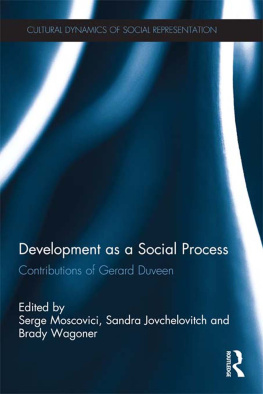APPRAISING THE HUMAN DEVELOPMENTAL SCIENCES
LANDSCAPES OF CHILDHOOD
General Editor
Elizabeth N. Goodenough, Residential College, University of Michigan
Editorial Board
Louise Chawla, Kentucky State University
Robert Coles, Harvard University
Donald Haase, Wayne State University
Gareth Matthews, University of Massachusetts
Robin Moore, North Carolina State University
Michael Nettles, University of Michigan
Zibby Oneal, author of childrens books
Valerie Polakow, Eastern Michigan University
Roger Hart, City University of New York
Pamela F. Reynolds, Johns Hopkins University
John Stilgoe, Harvard University
Marcelo Suarez-Orozco, Harvard University
Jack Zipes, University of Minnesota
A complete listing of the books in this series
can be found online at wsupress.wayne.edu
APPRAISING THE HUMAN DEVELOPMENTAL SCIENCES
Essays in Honor of
Merrill-Palmer Quarterly
Edited by Gary W. Ladd

2007 by Wayne State University Press, Detroit, Michigan 48201.
All rights are reserved.
No part of this book may be reproduced without formal permission.
Manufactured in the United States of America.
11 10 09 08 07 5 4 3 2 1
Library of Congress Cataloging-in-Publication Data
Appraising the human developmental sciences :
essays in honor of Merrill-Palmer quarterly / edited by Gary W. Ladd.
p. cm.
ISBN-13: 978-0-8143-3342-6 (pbk. : alk. paper)
ISBN-10: 0-8143-3342-7 (pbk. : alk. paper)
1. Developmental psychology. 2. Child development. 3. Child psychology.
I. Ladd, Gary W., 1950II. Merrill-Palmer quarterly
(Wayne State University Press)
BF713.5.A67 2007
155dc22
2006030894
The paper used in this publication meets the minimum requirements
of the American National Standard for Information Sciences
Permanence of Paper for Printed Library Materials, ANSI Z39.481984.
Contents
Gary W. Ladd
I.
The Origins and Evolution of Merrill-Palmer Quarterly:
A Historical Overview
Gary W. Ladd
II.
Essays in Honor of the 50th Anniversary of Merrill-Palmer Quarterly
Jerome Kagan
John H. Flavell
Robert V. Kail
Robert S. Siegler
Mary K. Rothbart
Nancy Eisenberg, Claire Champion, and Yue Ma
Carol S. Dweck and Bonita E. London
Thomas J. Berndt
Kenneth H. Rubin and Robert J. Coplan
Richard A. Fabes, Carol Lynn Martin, and Laura D. Hanish
Judy Dunn
Ross D. Parke
Lawrence J. Walker
Grazyna Kochanska and Nazan Aksan
Robert Plomin
Kenneth A. Dodge
Robert J. Sternberg and Elena L. Grigorenko
Elliot Turiel
Deborah Lowe Vandell
Craig T. Ramey and Sharon L. Ramey
John E. Lochman
Robert B. McCall, Christina J. Groark, and Robert P. Nelkin
Introduction
Merrill-Palmer Quarterly at Age 50, An Occasion for Appraising the Past, Present, and Future of the Human Developmental Sciences
Gary W. Ladd
In 2004 Merrill-Palmer Quarterly: A Journal of Developmental Psychology marked its 50th anniversary, which provided an occasion to celebrate the journals heritage, its long history of scholarly contributions to the human developmental sciences, and its current and future mission as a purveyor of scientific discoveries. This juncture provided a vantage point from which to appraise the scientific endeavors that generated the contents of MPQ and its sister publications during the latter half of the 20th century and the first few years of the 21st century.
This Books PurposesOne can argue that the best way to gauge the progress and prospects of a scientific discipline is to examine it from three perspectives, all of which have the potential to be instructive for current and future investigators. Hindsight offers a view of the past, a viewpoint from which assays can be made of the scientific yield from pursuing various theories and and empirical investments. Coincident, or side-long, glances permit assessments of the current state of the science, including recent trends, innovations, and discoveries that have emerged within specific subdisciplines or areas of inquiry. Finally, foresight lends itself to the process of projecting the future of existing lines of investigation, anticipating impediments to progress (and devising strategies to circumvent these obstacles), and identifying promising new frameworks and innovative objectives.
This Books ContributorsTo capitalize on this opportunity to assess the state of developmental psychology, the editors of Merrill-Palmer Quarterly invited senior investigators whose research programs and accomplishments span many of the last 50 years to write the chapters that appear within this volume. Earlier versions appeared as invited commentaries within special anniversary issues of Merrill-Palmer Quarterly during the 2004 calendar year (volume 50, numbers 1, 3, and 4). All the contributors have at least two things in common: each has made a contribution to Merrill-Palmer Quarterly at some point in her or his career (e.g., as an author, reviewer, board member, former editor or associate editor, etc.), and all are leaders within their respective disciplines and the larger domain of the human developmental sciences.
An Overview of This Books Organization and ContentThe chapters are remarkably diverse, both individually and as a collection. Each author provides an integrated analysis of one or more interconnected research domains, and in this context they critically review past research accomplishments (e.g., a historical perspective on critical concepts and findings), current progress (e.g., the contemporary status of pertinent theories and findings), and future directions (e.g., a vision of the future; prospects for new lines of investigation). As a whole the anthology speaks to most of the subdisciplines that comprise the human developmental sciences, and, consistent with its purpose, the book reflects the scope and complexity of the research findings that MPQ has published during its 50 years of existence.
The first chapter provides a historical overview of the confluence of events, people, institutional forces, and publication trends that brought Merrill-Palmer Quarterly into existence and contributed to its longevity (Ladd, 2004). The remaining 22 chapters contain treatises on the scientific enterprise and the utility of specific research agendas that have evolved within the human developmental sciences. Although these chapters need not be read consecutively, the volume is organized to promote an analysis of agendas, accomplishments, and innovations that is relevant not only within major substantive domains but also across subdisciplinary boundaries.
Toward this end, the chapters are organized around ten conceptual themes. The first, methodological and interpretive considerations, contains a single chapter titled The Limitations of Concepts in Developmental Psychology. The author of this chapter, Jerome Kagan, considers how past scientific research traditions and agendas have shaped the way that modern investigators conceptualize the phenomena they investigate, how these conceptual commitments may hinder the work of modern developmental scientists, and, ultimately, how they may restrict the progress of the entire discipline. Chief among the concerns that Kagan raises is the theoretical shortsightedness that has accrued from the way investigators have construed and defined developmental phenomena. Kagan argues that developmentalists have too often created concepts to represent aspects of development that have been modeled after approaches used in other branches of science (e.g., physics) and that a consequence of this practice is that these concepts tend to be too rigid and abstract to fully capture developmental phenomena and the full range of properties or dynamics that define these phenomena. Related concerns are definitions of developmental concepts that do not reflect the contexts in which they were discovered or the milieu in which they operate, and that this theoretical imprecision encourages investigators to overestimate the meaning, properties, and applicability of developmental concepts. Kagan also offers guidance as to how contemporary investigators might address these concerns and problems. He explores several potential solutions, including both methodological and substantive avenues, and illustrates them with relevant scientific examples.
Next page






